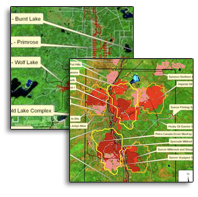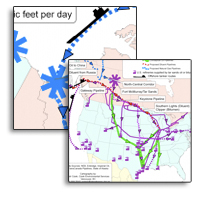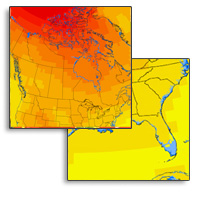Tar Sands 101
The Tar Sands "Gigaproject" is the largest industrial project in human history and likely also the most destructive. The tar sands mining procedure releases at least three times the CO2 emissions as regular oil production and is slated to become the single largest industrial contributor in North America to Climate Change.
The tar sands are already slated to be the cause of up to the second fastest rate of deforestation on the planet behind the Amazon Rainforest Basin. Currently approved projects will see 3 million barrels of tar sands mock crude produced daily by 2018; for each barrel of oil up to as high as five barrels of water are used.
Human health in many communities has seriously taken a turn for the worse with many causes alleged to be from tar sands production. Tar sands production has led to many serious social issues throughout Alberta, from housing crises to the vast expansion of temporary foreign worker programs that racialize and exploit so-called non-citizens. Infrastructure from pipelines to refineries to super tanker oil traffic on the seas crosses the continent in all directions to allthree major oceans and the Gulf of Mexico.
The mock oil produced primarily is consumed in the United States and helps to subsidize continued wars of aggression against other oil producing nations such as Iraq, Venezuela and Iran.
To understand the tar sands in more depth, continue to our Tar Sands 101 reading list
Don’t tar Utah
Don’t tar Utah
The Salt Lake Tribune
Aug 7, 2010
With little advance notice, a plan to extract Utah’s tar sands was presented last week at a hearing of Utah’s Division of Oil, Gas and Mining, which can rule on the plan in a month (“Groups challenge plans for Utah tar sands mine,” Tribune, July 27).
Beautiful destruction disturbs and enchants
Beautiful destruction disturbs and enchants
Thursday,
05 August 2010
Centretown News
Imagine a world of swirling technicolour among unearthly vistas of an unfathomable scale, without any obvious signs of flora or fauna.
While it seems like a description of a fantastic land like those of Tolkien or Star Trek, photographer Louis Helbig exposes these landscapes as those of the Canadian hinterland in Northern Alberta.
Canada's energy industry: Tarred with the same brush
Canada's energy industry
Tarred with the same brush
The Gulf spill has focused American minds on pollution from Canadian oil producers. But cleaning up the tar sands will not be easy
Aug 5th 2010 | ottawa
The Economist
Tar Sands Mining in Canada Creates Mercury, Arsenic Pollution
Oil-Sands Mining in Canada Creates Mercury, Arsenic Pollution, Globe Says
By James Kraus - Aug 10, 2010
Bloomberg
Canada’s oil sands mining operations are producing vast and fast-growing amounts of mercury, heavy metals, arsenic and other toxic substances, the Globe and Mail reported, citing data released by Environment Canada.
The volume of arsenic and lead produced and left behind in talings ponds by bitumen mines run by Syncrude Canada Ltd, Suncor Energy Inc. Canadian Natural Resources Ltd. and Royal Dutch Shell Plc rose 26 percent, the newspaper reported.
Aecon Group adds Alberta tar sands contractor
Aecon Group adds Alberta oil sands contractor
Eric Lam, Financial Post
Aug. 9, 2010
TORONTO -- Toronto-based Aecon Group Inc. said Monday it has offered to purchase the assets of Alberta oil sands contracting services business Cow Harbour Construction Ltd., currently under creditor protection, for $180-million.
If approved, Aecon would become one of the largest mining and land reclamation contractors in the oil sands. It is already the largest construction and infrastructure development company in Canada.
Tar sands toxins growing rapidly
Oil sands toxins growing rapidly
Volume of arsenic, lead increased 26 per cent in last four years, Environment Canada says
Nathan VanderKlippe
From Tuesday's Globe and Mail
Aug. 09, 2010
Canada’s oil sands mining operations produce vast and fast-growing quantities of deadly substances, including mercury, heavy metals and arsenic, new data released by Environment Canada shows.
Madagascar oil auction seen in Oct this year
Madagascar oil auction seen in Oct this year
JOHANNESBURG, Feb 9 (Reuters) - Madagascar's auction of 50 offshore Indian Ocean oil blocks is likely to proceed in October this year after months of political turmoil delayed the process, a senior official said on Tuesday.
The auction has been postponed due to a military-backed coup on the island last year, but Joeli Lalaharisaina, acting director general of the Office of National Mines and Strategic Industries (OMNIS), said it would happen this year.
Suncor Energy reports tar sands production numbers for July 2010
Suncor Energy reports oil sands production numbers for July 2010
CALGARY, ALBERTA, Aug 05, 2010 (MARKETWIRE via COMTEX) -- Suncor Energy Inc. reported today that the company's oil sands production during July averaged approximately 322,000 barrels per day (bpd). Year-to-date oil sands production at the end of July averaged approximately 260,000 bpd. Suncor is targeting average oil sands production of 280,000 bpd (+/- 5%) in 2010.
Oil leak in Michigan shines negative spotlight on Canada's Enbridge
Oil leak in Michigan shines negative spotlight on Canada's Enbridge
By: Lee-Anne Goodman, The Canadian Press
3/08/2010
WASHINGTON - The leak of more than three million litres of Alberta crude from a Canadian pipeline into a rural Michigan creek is shining a harsh spotlight on Canada's Enbridge Inc. in a country increasingly fed up with Big Oil after months of devastation in the Gulf of Mexico.
EPA Calls For Further US Government Study Of Tar Sands Pipeline
EPA Calls For Further US Government Study Of Oil-Sands Pipeline
* JULY 21, 2010
By Edward Welsch
Of DOW JONES NEWSWIRES
CALGARY (Dow Jones)--The environmental impact of crude production from Canada's oil sands should be studied more closely before the U.S. approves a new pipeline from its northern neighbor, the U.S. Environmental Protection Agency said Wednesday.



